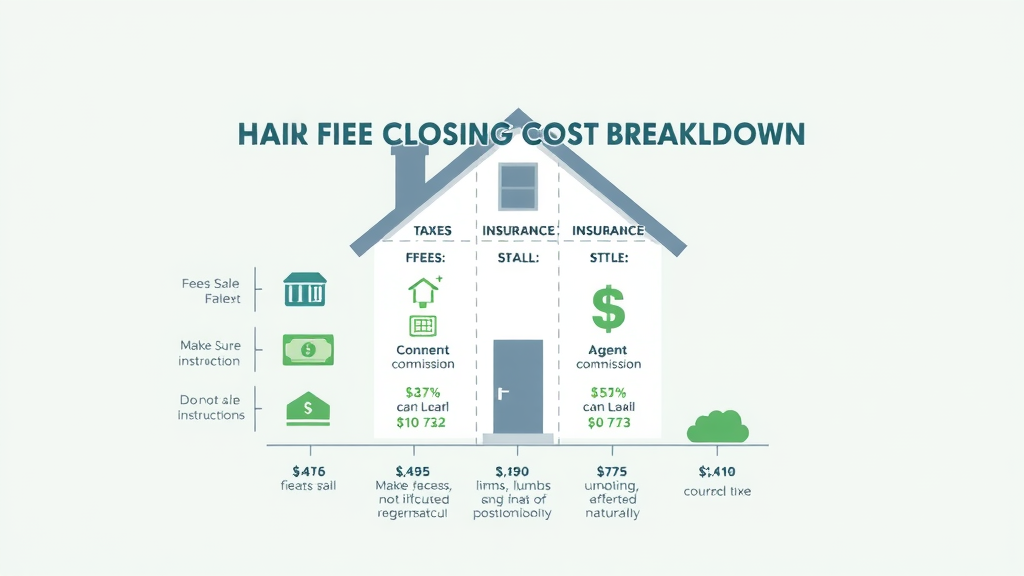Did you know that in the U.S., home sellers pay over $100 billion in real estate agent fees and realtor commissions every year? Real estate agent fees are more than just a percentage—they directly impact your bottom line when buying or selling property. Whether you’re a first-time buyer, home seller, or an investor aiming to maximize profit, understanding these costs can make or break your real estate transactions. If you’ve ever questioned what those agent commissions really pay for—or wondered if you’re spending more than you should—this comprehensive guide reveals the eye-opening facts, industry rates, and insider negotiation strategies that every savvy buyer or seller must know.
Shocking Facts About Real Estate Agent Fees and the True Cost of Buying or Selling Property
For most Americans, buying or selling a home is the largest financial transaction of their lives—yet few realize just how much real estate agent fees absorb from the sale price. Real estate agent fees are typically based on a commission rate, usually between 5% and 6% of the final sale price of the home. When you consider that the average U.S. home now sells for more than $375,000, that means sellers could pay $22,500—or more—in commission alone. What’s even more surprising is that these commission costs are just one piece of the puzzle; when combined with closing costs, moving expenses, and necessary repairs, the final bill can be much higher than anticipated.
Sellers aren’t the only ones affected by these fees. Buyers also face considerable expenses, from agent commissions to closing costs, not to mention other potential charges that can quickly add up. But where does all that money go, exactly? And are agent commissions and realtor fees really negotiable? Below, you’ll find practical examples, expert tips, and a statistical breakdown of what you can expect—and how to make smarter decisions to keep more money in your pocket.

How Real Estate Agent Fees Impact Home Sale Profits
Real estate agent fees play a pivotal role in determining the net profit a seller walks away with after a home sale. The commission cost—usually structured as a percentage of the sale price—can mean thousands lost or gained, depending on your negotiation and local market standards. Sellers often overlook additional closing costs that can erode profits even further, such as attorney fees, transfer taxes, and inspection charges. By understanding exactly how agent commissions affect the sale, home sellers can strategize to minimize expenses.
- Key reasons real estate agent fees shape sellers' net profits
- Average real estate commission rates in the U.S.
- Surprising statistical breakdown of closing costs
- Common realtor fee structures explained
The traditional commission rate for a listing agent in the United States hovers between 5% and 6%, but it is possible to find full-service agents willing to negotiate lower commission structures, such as flat fees or reduced percentages for high-value homes. Buyers and sellers should always clarify the fee structure upfront to avoid hidden surprises and better calculate net proceeds or costs. This awareness is critical for anyone looking to maximize profit when selling a home or to minimize out-of-pocket expenses as a buyer.
What You'll Learn About Real Estate Agent Fees
- The breakdown of typical real estate agent fees and real estate commissions
- How agent commission rates are determined
- Insider knowledge on negotiating real estate agent commissions
- A clear understanding of closing costs and other related realtor fee details
Breaking Down Real Estate Agent Fees: Components, Commission Rates, and How They Work
What Makes Up a Typical Real Estate Agent Commission?
Real estate agent commission is often the largest line item in a transaction’s closing costs, representing the main “realtor fee” paid at the completion of the sale. Unlike closing costs that cover things like loan origination or title insurance, agent commissions are the payment for professional representation and marketing. This fee usually covers listing the property on the multiple listing service (MLS), marketing and showing the home, negotiating offers, facilitating contract details, and guiding the transaction to a successful close.

- Definition of real estate agent fees vs. closing costs
- What the agent commission typically covers
- Who pays the real estate commission (usually the seller, though costs may be factored into the sale price)
Commission is traditionally a percentage of the home’s final sale price. For example, on a property selling for $500,000 with a 6% commission, the total agent commission would be $30,000, generally divided evenly between the buyer’s agent and the seller’s agent. This split incentivizes both parties to work diligently toward a completed transaction. It's possible for some sellers to negotiate lower fees or for agents to offer reduced rates in certain circumstances, reinforcing the importance of open discussion before committing to an agent.
Commission Rates Explained: Understanding Industry Standards
Commission rates vary regionally and according to local market conditions, competition among agents, and service offerings. While the national average is around 5.5%–6%, rates can be as low as 4% in highly competitive markets or with discount brokerages. It’s essential to understand the prevailing rate in your area, as a fraction of a percent can amount to thousands of dollars when calculated against the sale price. Some full-service agents offer bundled services that justify higher rates, while others may provide à la carte pricing for those seeking a lower commission rate.
| Region | Average Real Estate Agent Commission (%) | Notes |
|---|---|---|
| West Coast (CA, WA, OR) | 5.0% – 5.5% | Highly competitive markets; some agents offer lower rates |
| East Coast (NY, MA, DC) | 5.0% – 6.0% | Many listings require premium marketing and service |
| Midwest (IL, OH, MI) | 6.0% | Traditional rates still common |
| South (TX, FL, GA) | 5.5% – 6.0% | Agent competition increasing; discount brokers emerging |
Sellers should compare agent commission rates alongside offered services, reputation, and local expertise before making a decision. The negotiation of agent commission remains one of the most effective ways to maximize your return as a home seller.
Estate Agent Commission vs. Realtor Fee: Are They the Same?
Many people use realtor fee and estate agent commission interchangeably, but there are subtle distinctions. In general, a “realtor fee” refers specifically to fees charged by a licensed Realtor®—a member of the National Association of Realtors—while an “estate agent commission” can be used more broadly for both licensed agents and brokers who may or may not hold the Realtor designation. Structurally, both typically involve a percentage of the home’s selling price paid out at closing but may differ in the level of service, resources, or legal duties provided.

- Explaining the difference between a realtor fee and estate commission
- How real estate agents and estate agents structure fees
Estate agents may offer a range of commission options, such as tiered service levels or flat fee models, particularly in markets outside the U.S., like the U.K. or Australia. Realtors , by contrast, tend to follow the local MLS’s customary commission rates and operate within a set code of ethics established by the National Association of Realtors. As a buyer or seller, it’s important to clarify your agent’s qualifications and their fee structure before signing any contract.
"The majority of U.S. buyers and sellers overlook several hidden components in real estate agent commission rates."
How Real Estate Agent Fees Affect Buyers and Sellers
Buyer Costs: Closing Costs, Real Estate Commission, and More
While sellers typically pay the majority of real estate agent commissions, buyers also encounter significant expenses when purchasing property. Closing costs for buyers often include loan origination fees, title insurance, appraisal fees, and transfer taxes, which can total 2–5% of the purchase price. Though buyer agents’ services are often “free” to the buyer on the surface—their commission is covered by the seller—it’s important to remember that the commission is factored into the overall sale price. On a $400,000 home, buyers may still be paying, indirectly, a portion of the $24,000 real estate commission through a higher transaction cost.
- Closing cost breakdown for buyers
- How agent commission integrates with closing costs
- Other real estate fees to anticipate when buying a home

Buyers should also budget for inspections, escrow fees, and incidentals not always covered by traditional closing cost estimates. Comparing estimates from multiple agents and lenders is one of the best ways for homebuyers to minimize total real estate transaction costs.
Seller Concerns: Real Estate Agent Commission and Net Proceeds
For home sellers , the total real estate agent commission can be the single largest deduction from the home sale price. A 6% commission on a $300,000 sale deducts $18,000, significantly impacting net proceeds. Sellers seeking to optimize their return should understand how agent commissions are split and what services are included in their realtor’s marketing package. Many agents offer tiered commission plans, which may allow sellers to save by opting for fewer services or negotiating a lower commission for higher-value homes.
- How real estate agent fees reduce seller net proceeds
- Strategies to minimize realtor fee exposure during a home sale
Hidden transaction costs can also shrink the seller’s final payout. Beyond agent and broker fees, sellers may need to pay for staging, pre-inspections, repairs discovered during the selling process, or seller-side escrow and legal fees. Proactive sellers who account for all these expenses upfront are better positioned to price their homes competitively while retaining more of their equity at closing.
- List of hidden real estate transaction costs to factor in
Real Estate Commission Rates: What You Need to Know
Standard Agent Commission Rates Across Different Markets
The standard agent commission rates in the United States fluctuate by location, property type, and market demand. Urban areas like San Francisco or New York may see slightly lower commission rates due to high competition and elevated property values, while smaller markets often stick closely to the 6% norm. It’s rare for U.S. agents to work for less than 4.5%, especially in markets with less inventory.
| Metro Area | Average Commission Rate (%) | Typical Range |
|---|---|---|
| Los Angeles, CA | 5.0% | 4.5–5.5% |
| Chicago, IL | 6.0% | 5.5–6.0% |
| Houston, TX | 5.5% | 5.0–6.0% |
| Miami, FL | 5.5% | 5.0–6.0% |
| National Average | 5.7% | 5.0–6.0% |
Local custom and agent experience also play major parts in commission negotiations. Buyers and sellers are encouraged to interview multiple agents, compare fees and service levels, and consult recent data for their metro area to ensure they are getting fair value.
How Negotiable Are Commission Rates and Realtor Fees?
Real estate commission rates are not set in stone. Sellers can—and should—negotiate with their agents, especially if their property is in a high-demand market, is priced above regional averages, or requires minimal marketing. Some agents offer sliding commission rates for multi-million-dollar listings or “à la carte” services for sellers comfortable handling marketing or showings themselves. Be direct when discussing expectations, and don’t hesitate to ask for a lower commission if you’re interviewing multiple agents or leveraging referrals.

- Actions sellers can take to lower their real estate agent fees
- Tips for negotiating the agent commission with estate agents
Transparency is your ally: know what services are included in each commission proposal, and obtain agreements in writing. While some agents may be unwilling to negotiate due to brokerage policy or market saturation, even modest reductions in commission rate can mean thousands saved at closing.
"Transparent commission negotiation gives you control over your home sale’s bottom line."
View a quick video breakdown of how agent commissions are structured, who pays, and what services are included with each fee model. (Video content not included in this article.)
Estate Agents Versus Real Estate Agents: Who Gets Paid, and How?
Estate Agent Commission Distribution: Buyer’s Agent vs Seller’s Agent
In a typical U.S. home sale, the real estate agent commission is split between the listing agent (representing the seller) and the buyer’s agent. For example, on a $400,000 home with a 6% total commission, $12,000 goes to the listing agent and $12,000 to the buyer’s agent. These amounts are then further divided with each agent’s brokerage according to their internal commission split agreement. This symmetrical arrangement ensures both buyer and seller agents are incentivized toward a successful and timely closing.
- The split of agent commission between the buying and selling side
- Estate commissions versus real estate agent commissions: differences and similarities

In markets like the U.K. or Australia, estate agents often represent only the seller and may offer bespoke marketing options or “no sale, no fee” arrangements. In the U.S., however, dual agency—where one agent represents both parties—is more rare and strictly regulated due to conflicts of interest.
How Real Estate Agents Add Value for the Fees They Command
Real estate agents provide more than just marketing a home. Their expertise includes pricing strategy, access to the multiple listing service (MLS), conducting showings, negotiating offers, managing paperwork, and expertly troubleshooting any issues during escrow. An experienced agent can help buyers find off-market opportunities or highlight costly red flags in property disclosures. For sellers, a top agent will deploy high-impact photography, staging advice, targeted digital advertising, and keen analytics to maximize sale price and minimize time-on-market.
- Services provided by real estate agents
- Why buyers and sellers pay for agent expertise and support
Agents who understand their market and possess strong negotiation skills frequently net their clients more than the cost of their commission—a value proposition backed by data from the National Association of Realtors and other industry organizations. Buyers and sellers who forgo agent support risk costly mistakes, overlooked legal issues, or weaker final outcomes.
"A qualified real estate agent can net clients more than the cost of their commission."
Watch a video explaining why the services of professional estate agents matter at every stage of a real estate transaction. (Video content not included in this article.)
Closing Costs Versus Real Estate Agent Fees: Key Differences Explained
A Detailed Breakdown of Closing Costs for Home Sales
Closing costs refer to all the fees and charges buyers and sellers pay to finalize a real estate transaction, excluding agent commission. For sellers, closing costs may include transfer taxes, escrow fees, attorney fees, and title insurance, while buyers typically pay loan origination fees, appraisal costs, prepaid taxes, and insurance premiums. On average, closing costs range from 2% to 5% of the sale price and can be negotiated or shared between parties in many cases.
- Line-item examples of closing costs beyond the commission
- How closing costs and agent commission interact during escrow

Both agent commission and closing costs are reconciled during escrow, often deducted from the proceeds before the seller receives their final check. Sellers need to distinguish between these items for accurate calculation of net proceeds.
Table: Closing Costs vs. Real Estate Agent Commission
| Fee Type | Who Pays? | Typical Percentage or Amount |
|---|---|---|
| Real Estate Agent Commission | Seller (unless negotiated otherwise) | 5%–6% of sale price |
| Transfer Taxes | Buyer/Seller (varies by state) | 0.1%–2% of sale price |
| Title Insurance | Buyer/Seller (typically split) | $500–$3,000 flat fee |
| Attorney Fees | Buyer/Seller | $500–$2,500 average |
| Appraisal Fee | Buyer | $400–$850 |
| Loan Origination Fee | Buyer | 0.5%–1% of loan amount |
People Also Ask: Essential Questions About Real Estate Agent Fees
What percentage do most realtors charge?
- The average percentage for real estate agent fees in the current real estate market

Most Realtors in the U.S. charge a commission of 5% to 6% of the home’s final selling price. The exact rate depends on location, market conditions, and level of service provided, but 6% remains the traditional benchmark in many areas. Buyers and sellers should know these rates are negotiable and should confirm all terms in their agent contract.
What is the commission on a $300,000 house?
- Example breakdown of agent commission for a $300,000 sale, including buyer’s agent and seller’s agent shares

A typical 6% commission on a $300,000 home sale equals $18,000. Usually, this is split equally between the listing agent ($9,000) and the buyer’s agent ($9,000), though brokerage fees and other agreements may adjust these amounts. Some agents may negotiate a reduced rate for higher-value or quick sales.
What fees do most estate agents charge?
- Common estate agent commission structures and additional realtor fee items
Most estate agents charge a commission fee based on a percentage of the property’s sale price—typically between 4% and 6%. Additional fees may include administrative charges, marketing expenses, photography, or enhanced listing service upgrades. Details should always be clarified before signing any listing agreement.
What are the expenses of a real estate agent?
- Ongoing costs real estate agents incur, from marketing to licensing and association fees

Real estate agents face a range of operating costs including ongoing marketing, professional licensing, MLS dues, continuing education, association membership fees (e.g., the National Association of Realtors), website maintenance, and even staging expenses. Many agents are also responsible for their own health insurance and tax withholdings, affecting how much commission ultimately becomes take-home pay.
FAQs on Real Estate Agent Fees, Agent Commission, and Closing Costs
- Do real estate agents ever waive their commission? It is rare, but some agents may waive all or part of their commission for personal transactions, close family, or as part of a negotiated sale. However, most agents rely on commissions for income and will only reduce or waive them under unique circumstances.
- Are real estate agent commissions tax-deductible? For home sellers, commissions and closing costs on a primary residence are typically not tax-deductible, but they may reduce the reportable gain for capital gains tax calculations. Investment or rental property commissions may be deductible as selling expenses.
- How are agent commissions split between brokerage and agent? Commissions are typically split between the brokerage and the agent according to the agent's agreement. A common split is 60/40 or 70/30 in favor of the agent, but newer agents may start at a lower split. Brokerages may also charge desk fees or transaction fees in addition to commission sharing.
- Can you negotiate closing costs along with real estate commission? Yes! Both closing costs and agent commissions are subject to negotiation. Buyers or sellers can request that the other party cover part of their closing costs, and agents may also agree to reduced commissions under the right conditions. Everything is negotiable until the contract is signed.
Expert Quotes on Negotiating Real Estate Agent Fees
"The smartest buyers and sellers view real estate agent commission as both an expense and an investment." – Real Estate Analyst
"A proactive discussion about closing costs and agent commission can save thousands." – Veteran Estate Agent
Learn strategies and case studies for negotiating lower agent commission while maximizing support and results. (Video content not included in this article.)
How to Choose a Real Estate Agent Based on Fees and Value
- Checklist for evaluating real estate agents’ commission rates, service offerings, and professional expertise

Choosing the right real estate agent goes far beyond picking the lowest commission rate. Use this checklist before signing with an agent:
- Compare commission rates and ask for a detailed service breakdown
- Review marketing strategy, listing quality, and communication skills
- Check for local market expertise and high client satisfaction ratings
- Request references and examples of recent sales similar to your property
- Ensure the agent is licensed and in good standing with the state and relevant professional associations
- Clarify all additional fees or costs up front
Takeaways: Real Estate Agent Fees and Successful Transactions
- Understand every component of real estate agent fees
- Always ask questions about agent commission and real estate commissions
- Remember: fees are negotiable, transparency matters, and value counts
Action step: Interview multiple agents, compare detailed proposals, and negotiate both commission and closing costs before making your next real estate move!
 Add Row
Add Row  Add
Add 




Write A Comment